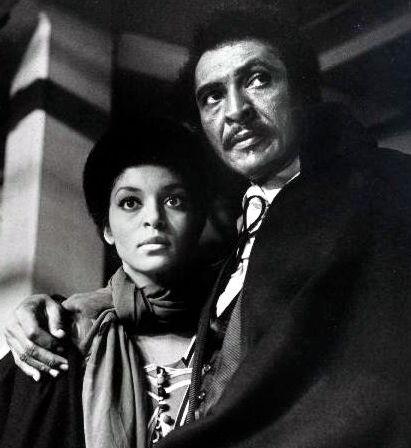
A life that leads a man from being a struggling young actor to finding fame as an infamous blaxploitation genre character to becoming a beloved children's television character is an unlikely proposition.
For William Marshall (1924-2003) this was his life. This meant after growing up in the dying steeltown of Gary, Indiana, getting an education in New York, gaining experience in traveling theater, building a strong reputation as a talented performer in minor television productions then Marshall had to face industry wide segregation in order to perform at the height of his powers to a largely racist audience, both black and white, that didn't know Shakespeare from shinola.
Regardless of the difficulties faced by black actors, William Marshall was featured in a dynamic supporting role on a nationally broadcast television show, as the robotics genius Doctor Daystrom, in the original Star Trek series. He appeared in the 1968 episode The Ultimate Computer. Although Marshall never appeared on the show again there are multiple references to him. A notable mention of Marshall/Daystrom is in the 1989 Star Trek TNG episode The Measure of A Man. The episode title comes directly from MLK Jr.'s first book and deals with the civil rights of a new form of life.
Up to 1968, black actors had two choices: either work in subordinate and stereotypical roles that often forced talented actors and actresses to portray buffoons, villains, cooks, maids, and dim witted farmers or - join segregated all-black casts on low budgeted "B" productions in independent roles.
In choosing B productions, many actors, like Marshall, would find themselves in what evolved into "blaxploitation" films. In the late sixties and seventies these films were made for drive-ins and inner city matinees. Black Frankenstein (1973), Cleopatra Jones (1973), TNT Jackson (1974), The Guy From Harlem (1977), Avenging Disco Godfather (1979) and William Marshall's Blacula series were at the high end of this genre. They launched the careers of Keith David, Pam Grier, Yaphet Kotto and many more into mainstream films.
Today, we watch movies like Shaft (1971), that feature black leads as heros and accept Richard Roundtree for the most part. We want to be like the bad mutha not kill the bad mutha or sell him out. These contemporary views on films like Shaft separate our mentality about race (which still has a ways to go) from the highly segregated attitude and volatile era before them.
The highly segregated world was the world that William Marshall lived in. He worked in the pre-Shaft and pre-Action Jackson (1987) world where Hollywood did not officially acknowledge an integrated America. There were theaters strictly for either white or black audiences. The movies they ran were filmed with a cultural apartheid at work.
Although Marshall was an extremely talented actor he was denied his due because of the prevailing attitudes in Hollywood and the US in general. He was called the world's greatest living Othello in his day as a stage performer by many New York theater critics but was only featured in a handful of films. Without men like Marshall there would be no Lawrence Fishbourne as Morpheus or Denzel Washington as Malcom X or a Spike Lee that would have found funding to make an "A" picture like Malcom X (1992) let alone Do The Right Thing (1989). The only good part of a Blacula-less universe is that there wouldn't be a Robert Townsend or any Wayans Brothers, either.
In the eighties and early nineties, William Marshall found TV work again becoming the beloved "King of Cartoons" on Paul Reuben's Pee Wee's Playhouse. Marshall also continued to travel the Horror Con circuit for years after Pee Wee's Playhouse was cancelled by CBS. He is remembered as being warm and intelligent by many of those he worked with over his 50 year career in stage, film, and television production. William Marshall died at age 79, in 2003.
In closing, no matter what your opinion is, TV and Film owes thanks to undeniably talented men like Marshall. Generations of actors and audiences are better informed, thematically and culturally, for his struggle and success.
References:
IMDB, William Marshall
Exploitation Films, Avenging Disco Godfather
Pop Culture, Blacula
Invisible Cinema, Blaxpolitation
Startrek.com, The Ultimate Computer
